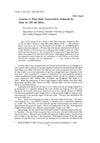21 citations,
June 1983 in “Pediatric clinics of North America/The Pediatric clinics of North America” Zinc is vital for skin health and overall body functions, and deficiency can cause serious health issues.

An infant with a zinc deficiency skin disorder improved with zinc treatment.
 14 citations,
April 2000 in “Animal Science/Animal science”
14 citations,
April 2000 in “Animal Science/Animal science” Nutrients like vitamins, copper, zinc, and amino acids are crucial for healthy hair and wool growth.
 January 2023 in “Journal of Ravishankar University”
January 2023 in “Journal of Ravishankar University” Hair loss can be caused by stress, aging, and harmful substances that create an imbalance in the body's natural processes.
 20 citations,
September 2005 in “Clinics in Dermatology”
20 citations,
September 2005 in “Clinics in Dermatology” Some skin problems can be signs of diabetes or other metabolic diseases and recognizing them can help diagnose and treat these diseases early.
 12 citations,
July 1979 in “International Journal of Dermatology”
12 citations,
July 1979 in “International Journal of Dermatology” A patient with zinc depletion improved after zinc supplementation during parenteral nutrition.
 5 citations,
April 2013 in “Nasza Dermatologia Online”
5 citations,
April 2013 in “Nasza Dermatologia Online” Oral zinc therapy is effective for treating acrodermatitis enteropathica.
 165 citations,
January 2014 in “Dermatology Research and Practice”
165 citations,
January 2014 in “Dermatology Research and Practice” Zinc is effective for treating various skin conditions, including warts and acne.
 114 citations,
October 2009 in “Gastroenterology”
114 citations,
October 2009 in “Gastroenterology” Zinc is crucial for nutrition, especially in patients with specific health conditions, and requires careful supplementation and monitoring.
 75 citations,
May 2013 in “Journal of the American Academy of Dermatology”
75 citations,
May 2013 in “Journal of the American Academy of Dermatology” Zinc deficiency in children can cause skin issues and can be serious if not diagnosed and treated properly.
 73 citations,
January 2013 in “Annals of Dermatology”
73 citations,
January 2013 in “Annals of Dermatology” People with hair loss, especially those with certain types, have lower zinc levels, and zinc supplements might help.
 5 citations,
December 2014 in “Polish Journal of Public Health”
5 citations,
December 2014 in “Polish Journal of Public Health” Zinc is essential for many body functions and imbalances can lead to health problems.
 April 2018 in “Assiut Veterinary Medical Journal/Maǧallaẗ Asyūṭ al-ṭibiyyaẗ al-baytariyyaẗ”
April 2018 in “Assiut Veterinary Medical Journal/Maǧallaẗ Asyūṭ al-ṭibiyyaẗ al-baytariyyaẗ” Zinc levels in body fluids can help diagnose zinc deficiency in lambs, with fecal zinc as an early indicator.
 60 citations,
October 2005 in “Experimental Dermatology”
60 citations,
October 2005 in “Experimental Dermatology” Zinc can both inhibit and stimulate mouse hair growth, and might help recover hair after chemotherapy.
 53 citations,
October 1978 in “Archives of dermatology”
53 citations,
October 1978 in “Archives of dermatology” Zinc supplements can resolve skin issues caused by zinc deficiency.
 35 citations,
January 2006 in “Journal of Dermatological Treatment”
35 citations,
January 2006 in “Journal of Dermatological Treatment” Zinc can help with some skin problems, but its effectiveness varies depending on the condition.
 21 citations,
June 2011 in “Journal of child neurology”
21 citations,
June 2011 in “Journal of child neurology” Valproic acid and carbamazepine do not change biotin or biotinidase levels but may lower zinc levels, still within normal range.
 21 citations,
April 2010 in “Molecular Medicine Reports”
21 citations,
April 2010 in “Molecular Medicine Reports” Zinc supplementation may help improve treatment outcomes for chronic hepatitis C.
 19 citations,
February 2018 in “Nutrients”
19 citations,
February 2018 in “Nutrients” Certain zinc transporters are essential for healthy skin and managing zinc in the body could help treat skin problems.
 4 citations,
January 1992 in “The Tohoku Journal of Experimental Medicine”
4 citations,
January 1992 in “The Tohoku Journal of Experimental Medicine” Zinc made mice's coarse hair turn into fine hair without affecting skin structure.
 3 citations,
November 2022 in “Frontiers in oncology”
3 citations,
November 2022 in “Frontiers in oncology” Low zinc levels may be linked to the return of gynecologic cancers.
 December 2023 in “Journal of nutritional science and vitaminology”
December 2023 in “Journal of nutritional science and vitaminology” A zinc-deficient diet stunted growth and affected organs in mice, with C57BL/6J mice showing more severe symptoms.
 June 2022 in “International Journal of Health Sciences (IJHS) (En línea)”
June 2022 in “International Journal of Health Sciences (IJHS) (En línea)” Pregnant women with hair loss often have low zinc and iron levels.
 January 2021 in “Middle East journal of applied sciences”
January 2021 in “Middle East journal of applied sciences” Zinc is essential for plant growth and human health, but many soils lack enough zinc, affecting crops and potentially leading to health problems.
36 citations,
October 2008 in “European journal of paediatric neurology” Valproic acid treatment may cause temporary hair loss due to reduced zinc and biotinidase levels, which tend to normalize after 6 months.
 4 citations,
December 2022 in “International Journal of Molecular Sciences”
4 citations,
December 2022 in “International Journal of Molecular Sciences” Zinc is crucial for skin health and treating various skin disorders.
 September 2022 in “JAMC. Journal of Ayub Medical College, Abbotabad, Pakistan/Journal of Ayub Medical College”
September 2022 in “JAMC. Journal of Ayub Medical College, Abbotabad, Pakistan/Journal of Ayub Medical College” A boy with a rare skin condition improved quickly after starting zinc supplements.
16 citations,
January 2010 in “Journal of Korean medical science/Journal of Korean Medical Science” A Korean boy's skin and digestive symptoms were caused by a rare genetic disorder that affects zinc absorption, and he got better with zinc supplements.
13 citations,
April 2019 in “International journal of molecular sciences” Acyzol could help treat conditions caused by zinc deficiency.
11 citations,
January 2017 in “Journal of research in pharmacy practice” The combination of zinc sulfate and calcium pantothenate effectively controls early-stage hair loss.
























